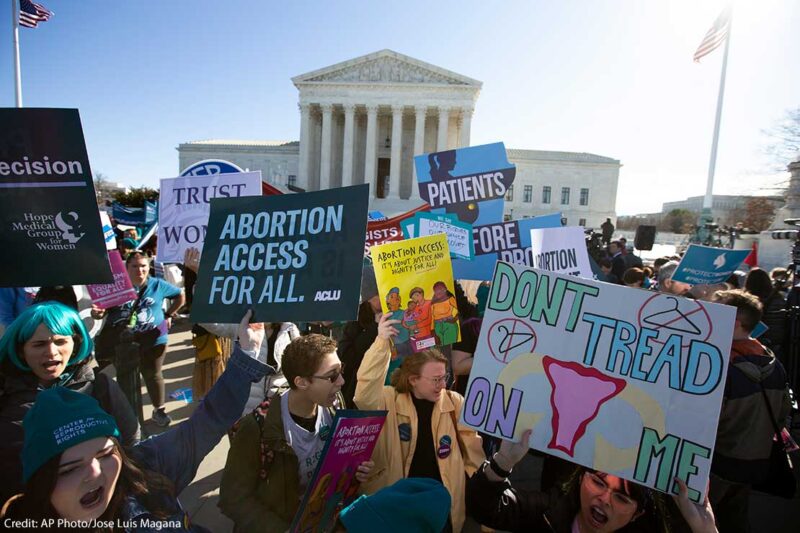The Right to Abortion is on the Ballot in Colorado This November


Nov. 3, 2020 update: Proposition 115 failed to pass, making it the fourth anti-abortion ballot measure in 12 years Colorado voters have rejected.
When Justice Ginsburg embarked on her legal career at the ACLU, there were hundreds of laws on the books that discriminated on the basis of sex. But Justice Ginsburg changed that, and she changed history, driven by the then-radical belief that laws steeped in gender stereotypes hurt both women and men. Significantly, she viewed reproductive freedom as a necessary component of true gender equality and dedicated her life’s work to ensuring the law was used as a tool to advance equality.
Her loss comes at a pivotal time as opponents of reproductive freedom and gender equality work strategically to roll back abortion rights. Since 2011, states have passed more than 460 abortion restrictions, eroding abortion access for far too many, including low-income people and people of color. President Trump has vowed to only appoint justices that promise to overturn Roe v. Wade. If his recent nominee is confirmed to the bench, the legal right to abortion will be in the gravest danger it has faced yet.
With federal protections for reproductive rights now precariously uncertain, it is more urgent than ever that the states safeguard access to abortion care. But in Colorado, that access is under a real, imminent threat: , a measure that would ban abortion later in pregnancy is on the ballot this year.
Prop. 115 would make it a crime for doctors to provide abortion care starting at 22 weeks in pregnancy, robbing pregnant people of the ability to make their own personal medical decisions without taking into consideration their personal situations. Prop. 115 is a one-size-fits-all mandate that fails to acknowledge every pregnancy is unique — and shows no compassion for what families face in unimaginably complicated circumstances. And it takes away the ability of doctors to provide the best medical care for their patients.
Prop. 115 ignores the stories of people like who was 20 weeks pregnant with her third child in May 2017 when she, her husband Roy, and their two children excitedly attended a routine mid-pregnancy ultrasound. After consulting with the ultrasound tech, and additional testing, Christina’s doctor delivered heartbreaking news: their baby would not survive birth. They decided to have an abortion.
“I get a little angry at the fact that I can't really let myself be too sad or grieve too much for the loss of my son because there's that feeling [it is] a blessing,” Christina . “Because we're so privileged to have lived in Colorado where we didn't have laws getting in the way. Our insurance covered it. I mean, just everything fell into place just perfectly to make this traumatic thing so much easier for us.”
Prop. 115 would do exactly what Christina and Roy didn’t need — get in the way of them making the best decision for their family. If it passes in November, families like the Taylors will no longer have access to compassionate abortion care in Colorado.
Let’s be clear: Abortion bans are not about health or medicine. They are about controlling our bodies and taking away our power to decide what is best for our own lives.
The of this initiative have not been secretive about their : They want to force every Coloradan to continue a pregnancy, with no exceptions for health or individual circumstances — even in cases of rape, risks to the pregnant person’s health, or a lethal fetal diagnosis.
Indeed, Prop. 115 is being pushed by many of the who have tried — and failed — to ban abortion in Colorado every year for the last decade. If Proposition 115 succeeds in Colorado this November, it will embolden its proponents to pursue bans even earlier in pregnancy with the ultimate goal of restricting all abortion access in Colorado and across the country.
In the landmark 1973 Supreme Court case Frontiero v. Richardson, which challenged a law that prevented men married to women who served in the military from receiving dependent benefits, Justice Ginsburg, then a litigator for the ACLU, famously quoted abolitionist Sara Grimke: “I ask no favor for my sex,” she said. “All I ask of our brethren is that they take their feet off our necks.”
This is all Coloradans are asking for: to control our own bodies, and our own futures. With Justice Ginsburg now gone, it falls on all of us to honor her legacy by continuing that fight. In Colorado, that means voting “NO” on Proposition 115.
Paid for by American Civil Liberties Union, Inc.; Anthony Romero, Registered Agent, and authorized by Abortion Access for All.

